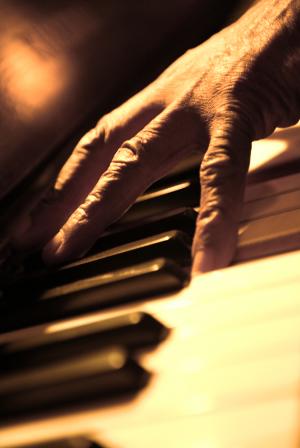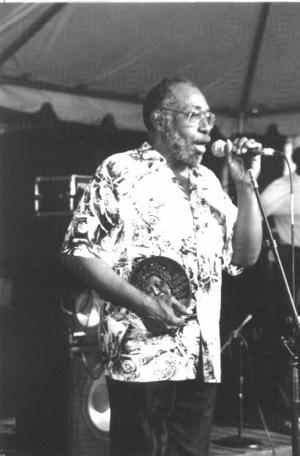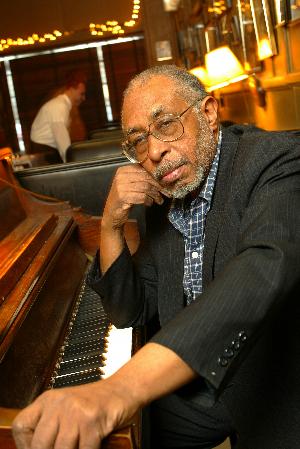social bookmarking tools:
 |
|
| Available RSS Feeds |
|---|
 - Top Picks - Top Picks |
 - Today's Music - Today's Music |
 - Editor's Blog - Editor's Blog
|
 - Articles - Articles
|
Add Louisville Music News' RSS Feed to Your Yahoo!
|
Renaissance Jazzman Ray Johnson Is On A Roll
Many musicians serve up a logical, distinctive reason for going into music, whether it be a lifelong love for all things musical, following the lead of a parent or sibling, or simply giving in to the path God laid before them.
Ray Johnson chuckles and fidgets when asked what landed him on a piano stool.
"I couldn't do anything else," he said. "I was a schmuck at athletics. All the other kids in my class were great basketball players, but I didn't have the skills." So it was that he joined the newly formed band of Louisville's Madison Junior High School sometime in the mid-1940s, one of Madison's first-ever "band geeks."
But consider this: The average length of a career for professional basketball players in the NBA is about three years; more than 50 years after signing up for that junior high band, Johnson continues to make a living playing music professionally. He also spent nearly 20 years in New York as a professional jazz pianist during the 1960s and '70s, appearing as an accompanist on virtually every important prime time TV show and in most of the important New York clubs, including the Improv.
Johnson also learned to produce and compose music as well. A true renaissance man, Johnson continues to write, release music and pursue numerous musical - and artistic - endeavors, even as he nears the age of 70.
Schmuck? No skills? Please.
FINDING HIS WAY
Until the school band was formed, all Johnson knew he had talent for was drawing. He loved music but had no outlet, no way to test his abilities. "But, of course I was interested," he said.
The first thing the Madison Junior High music teacher handed Johnson was a clarinet. "But I didn't want to play clarinet, I wanted to play trumpet," he said. "So I had my mother write a note."
So it was that the "my son does not want to play clarinet" note led to Johnson's first musical gig - trumpeter for the Madison Junior High School band. But the trumpet would soon lead to an interest in tickling the ivory. There was a broken-down piano in the band room closet where students kept their instruments and Johnson found himself experimenting with it anytime he got a chance.
"I just fell in love with the sound of it," he said. "So I talked my dad into helping me buy a piano."
The piano ended up becoming Johnson's first love, mostly because of its sound, but in part because there is a greater demand for pianists and in part because it's an instrument that doesn't require accompaniment. He soon developed a love for composition, which led him to study music with the goal of playing professionally.
Bassist Ben Ingram played with Johnson in the Central High School band back in the late 1940s - and currently plays alongside Johnson every Tuesday and Wednesday in a jazz combo at Jack Fry's Restaurant.

"We've been playing together off and on over the years," Ingram said. In high school, Johnson "was pretty much the same as he is now. He's a nice guy and real knowledgeable."
Ingram and Johnson marched up and down football fields, playing their hearts out. At age 15, Johnson became serious about becoming a professional musician and began to study with a trumpeter named Ted Jones - a beatnik poet who was well-connected in music circles. Jones organized music listening sessions at the local YMCA.
"He would come in with an armful of 78 rpm records and we would sit around listening and talking about this new music - be-bop," Johnson said in a 1981 interview.
Johnson would later play with Ted Jones' band, the Be-Boppers, as well as with George Burney and his Blue Flames and would perform with a number of jazz and rhythm and blues bands around Louisville for twelve years before moving to New York. Along the way, he played alongside jazz artists like Spike Vaughn, Duke Landers, Andy Jackson, Boogie Morton, Edgar Brooks, Preacher Stevens, Bill Jordan and Willard Aiden and traveled from Louisville to Chicago, Milwaukee, Cleveland, Detroit and around the region to perform.
But it wasn't just the performance that thrilled Johnson. Even Ingram noted that Johnson isn't just a renowned player - "he writes, too."
Indeed, composing is what has driven Johnson for all of his professional life. And Jones helped him learn the ins and outs of the music business. So it was that while in New York, Johnson said, he made half his living writing arrangements for singers and other musicians to present at auditions and in other settings.
In fact, he initially went to New York because it was a jazz hotbed. He told The Entertainer in 1983 that, "My ambition was to play with Miles Davis, but not long after I arrived in New York, rock `n' roll became very popular and jazz went down the drain. Even the Five Spot, one of the finest jazz night clubs in New York, turned into a rock `n' roll house."

It made earning a living more difficult for Johnson. Between playing nights, arranging and working days at ASCAP as a "musical analyst," transcribing music broadcasts onto file cards for identification (so the composers could be paid royalties), finding time to create personal compositions was difficult. He pressed on, looking toward someday having time to compose at will.
BEING PART OF IT ALL
Johnson lived in New York City's Lower East Side during the era when it was becoming the East Village. He lived there because "that's where the cheap rents were - then."(Paying rent there now, he noted, would likely require four or five jobs.)
By the mid-1960s, he had a wife and five kids. He frequently worked day and night, indexing music for ASCAP by day and playing at the Improv at night.
"I just backed the acts," he said. "That's how I got all my connections. When they needed a piano player they called me, because they knew me."
By "they," Johnson means an assortment of singers, comedians and other such talents that filtered through the New York club scene during the 1960s and 1970s. It's at this point that Johnson says, "Please don't use all that. That's just name-dropping."
But the truth is, Johnson was an important behind-the-scenes figure and it's telling to learn just how many talented people he worked with. The people he encountered weren't stars at the time - just people trying to climb their way up, just like he was. He played piano on the TV shows of Jack Parr, David Frost and Dick Cavett. He backed numerous musicians on "The Tonight Show" over the years.
His first week in New York, Johnson got a gig filling in for pianist Stanley Cowell in saxophonist Roland Kirk's band. With that group he would play various clubs over the next five years at a club in Greenwich Village called The Duplex, behind new showcasing acts such as then-unknowns like Joan Rivers, JoAnne Worley, Linda Lavin and Barry Manilow.
In 1967, Johnson composed an overture for a three-act musical titled "A Coffee Ground Among the Tea Leaves" and composed and performed incidental music for a revue called "Blanford Models." The next year, he became "pit pianist" behind various reviews at Upstairs at the Downstairs (often featuring fledgling performers Lily Tomlin and Fannie Flagg) and playing on "The Joan Rivers Show."
It was 1968 when he went to work as pianist at Budd Friedman's Original Improvisation on West 44th at 9th Avenue. This club featured new singers and comedians and would soon become known simply as the Improv. There Johnson backed comedians like Jimmy "J.J." Walker, Freddie Prinze, Gabe Kaplan, Rodney Dangerfield, Jay Leno, Joe Piscopo, Jerry Seinfeld, Richard Lewis and Richard Pryor.
Johnson soon would land a regular gig as Midler's rehearsal and audition pianist - largely because Friedman was her manager -- including the "Tonight Show" audition that would ultimately launch her career.
During this time, he also got involved in record producing for Motown acts, forming a record company called Focus Five with partner Will Crittenden.
"We put out artists and they ran us crazy," Johnson said with a chuckle.
And Focus Five's A&R people weren't exactly a joy to deal with either, he said. The idea was that Johnson and Crittenden would hire people to manage and promote acts for them so they could focus on producing and developing new artists.
"They would take an act, sell it and go on with the act themselves," Johnson said. Essentially, they would use Focus Five's money to get started and then steal the act away.
"It was small-time stuff, but I got a lot of experience" producing music, he said, which was one of the many artistic interests he hoped to pursue.
Once Johnson's stint at the Improv was over, he toured the West Coast with the Mattel Toy Company Industrial Show, before heading back east by way of Dallas, Atlanta and Chicago, stopping along the way for a gig at the Desert Inn in Las Vegas.
By the mid-1970s, Johnson was touring Canada with a singing group during the winter and playing in Caskill Mountains resorts during the summer. He would travel back to Vegas, to Bermuda and head back to New York in 1977 (after a six-month rest in Louisville during which he played downstairs at Actors Theatre of Louisville). It was then he met and began playing piano with an unknown singer named Pat Benatar, touring the East Coast with her first New York band.
But he never pounded the keys on "Hit Me With Your Best Shot."
"She just sang regular songs back then," Johnson said. "Then the rock `n' roll thing hit."
By the end of 1978, Johnson realized he had been backing up other musicians for nearly two decades and had found little time to work on his own music. Focus Five Records was gone and he longed for something that would take him out of the role of accompanist in search of composing time, recording opportunities and to "be my own boss for once."
He had split up with his wife and some of his family was still here in Louisville and when he came back home for another hiatus in 1980, he was able to find work. "I just decided to stay," he said.
THE RENAISSANCE BEGINS
Johnson landed at Joe's Palm Room, a long time jazz and R&B venue in Louisville, where he led his own five-piece band. He went on to play at the Hyatt Hotel Balcony Lounge, the Rib Tavern and the Savoy Restaurant on Main Street. He would later land a gig at the Executive Inn West with singer Jo Ann Hale and in 1982 and '83 was featured on the WHAS Crusade for Children telethon, playing piano with director Mel Owen's 16-piece orchestra
Most importantly, he began to reconnect with the Louisville music scene. The Louisville Federation of Musicians Local 11-637 named him 1983's Musician of the Year, allowing Johnson to join area legends like Country Music Hall of Famer Pee Wee King, jazz educator Jamey Aebersold and jazz guitarist Jimmy Raney as winners of the award. Things began to take off for him in Louisville.
While maintaining his frequent gigs around town, Johnson in 1985 was named arranger and music director for the Kentucky Center for the Arts' original Midnight Ramble stage show and led three different bands in three performances in KCA's Jazz in Central Park concerts. In 1988, the KCA honored him with its Kentucky Jazz Legend Award.
It should be noted that in '86 he played his first gig as house pianist at Jack Fry's, a five-star restaurant and popular nightspot in the Highlands. Over the next few years, his following there would grow and Johnson would begin to stretch out with his various interests.
The itch to record and produce resurfaced, but so did another of Johnson's artistic interests: acting. When a Humana Festival of Plays production called for an older African American male, the late jazz player and Public Radio jock Phil Bailey suggested Johnson for the part. "I don't know why," Johnson said with a laugh.
The play, called "Watermelon Rinds," included six weeks of rehearsal and two weeks of shows. But it wasn't such a foreign endeavor for the jazz pianist.
"I know about acting," he said. "I studied film and screen. And I auditioned and got the part. It was one of the most enjoyable experiences of my life."
From 1994-98, Johnson would help lead the Reunity Club, a group of area jazz players who would get together regularly to play everything from dance halls to Kentucky Center shows. He hopes to do a reunion show; some of the Reunity Club players were featured in Roger Dane's Monday night big band series at Comedy Caravan, but there are no set plans for another reunion.
"It went by the wayside because it's hard to run a band," Johnson said.
Johnson would go on to earn a U of L Jazz Studies Hall of Fame Award in 2001, bestowed upon one person each year for "outstanding contributions to the promotion and preservation of America's classical music - jazz."
He also became a regular performer in Kentucky Center's Jazz Cabaret Concerts and recently performed as part of In Performance at the Governor's Mansion, an annual series showcasing outstanding Kentucky artists and arts groups. Governor Paul E. Patton initiated the ongoing series.
But Johnson's latest project may very well be his favorite. That project is called Space Cadet Records, a label Johnson has created to produce and release not only his own music but also that of other jazz artists and composers around Louisville. In a way, it's an extension of Focus Five - except Johnson will be more hands-on.
"I'd like to finish up what we started then," he said. "I intend to get my legs under me and produce some local jazz artists. There's not a record company representing anybody right now."
Space Cadet has been registered as a limited liability company and the first two CDs have been released. One is a collection of standards titled Ray Johnson and Friends Play Jazz, Vol. 1 and features Johnson, Ingram on bass, David Wilson on tenor sax and Darryel Cotten on drums. The other is titled The Dynamic Duo, Vol. 1 and features Johnson and the late Scotty McLaury on clarinet.
Wilson is one who is impressed by Johnson's versatility and talent.
"He is modest about what he can do," said Wilson, who along with Ingram has played alongside Johnson at Jack Fry's for about three years. "He's a fine graphic artist, he performed in that play down at Actors Theatre. He's very knowledgeable about his computer. He's knowledgeable about all types of music. There's no telling what he can do. He's not your ordinary fellow."
Johnson produced both of the recently released discs and said three more full albums are in the can. Some are original compositions and there's a jazz version of the title track from the musical Phantom of the Opera. (The album, in fact, may be called Phantom.)
What he hopes will help him be successful is that he does all the production and artwork, which obviously saves on overhead. In addition to the albums in the can, he's spoken with Boogie Morton about releasing an album of his music sometime down the road.
"I want to let (my own) CDs spread out a little first," Johnson said.
Asked about where the name of the label came from, he explained, "I've had that name in mind for quite a while. I was thinking about starting a group called the Space Cadets. I decided against that - wisely - so I thought it would be good as Space Cadet Records."
Also coming soon: a summer release called Sound Paintings, which features Johnson's original electronic music. Johnson did all the voices and instruments electronically on his computer. Also, he plans to record some of his symphonic compositions and release them under the name Concert Miniatures.
"That's going to be the hardest one to put together," he admits. "Before I die, I want to do that."
As for how well Space Cadet recordings will be received locally, he believes they can do well with the right promotion. While the number of live jazz clubs tends to fluctuate and support can at times be inconsistent, Johnson points to not only U of L's fine jazz school, but the Louisville Jazz Society as proof of the support America's music has in the River City.
"Those people are fanatics," he said. "There should be a full house everywhere for jazz."
So why isn't there? "Things take money," he said with a smile, "and I seem to be the only one spending it."
Fortunately, Louisville's resident Renaissance man has a few other tricks up his sleeve. As a last resort, he could always get back into acting. He's known for the magic he creates with the ivory, but "Playing jazz piano is not all I do."
He can sure say that again.

